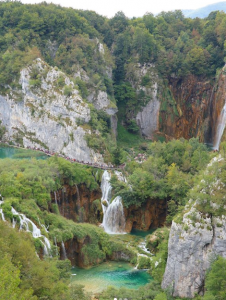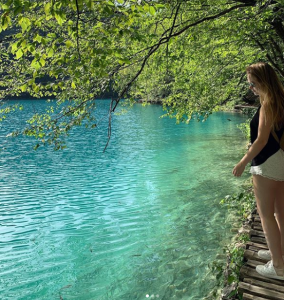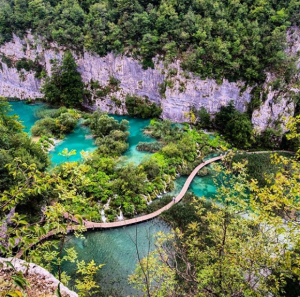The Plitvice Lakes National Park (Plitvicka jezera) is one of Croatia’s top sights. It is the most popular National Park in Croatia.Over 80% of the Plitvice Lakes National Park is covered by forest. These are mostly mountain beech forests or mixed beech and pine forests, with a special Forest Reserve – the Corkova uvala virgin forest.

The forest serves as a shelter and home to large predators and mammals, while the layer of leaves is one of the richest microhabitats in the world. This deep layer of decomposing material is home to vertebrates, such as salamanders and various mammals, and many invertebrates which either feed on decomposing leaves, fungi and bacteria or prey on other species in this habitat.Water makes up less than 1% of the entire protected area in the Plitvice Lakes National Park, but represents its most attractive part. The specific chemical composition of the water depends primarily on the type of bedrock. Today, all inland water, from the smallest pond to the largest lake, is inhabited by insects.In the karst areas of the Plitvice Lakes National Park, caves and pits are common and each has a multitude of various cave microhabitats and specific living conditions. Among the caves discovered to date, three are geomorphological nature monuments – Golubnjaca, Supljara and Crna pecina or Pecina Vile Jezerkinje.The most attractive part of Plitvice Lakes National Park, countless tufa waterfalls are also a specific habitat for the living world. The moss and higher plants visible to the eye conceal a diversity of microscopic life – algae, bacteria, insect larvae and invertebrates. These organisms are part of the complex and fascinating process of tufa deposition, which has been occurring in the Plitvice falls for thousands of years.On the grasslands (meadows and pastures) of the Plitvice Lakes National Park, soil diversity means a diversity of plants. We find dry habitats with acidic or carbonate soils, moderately wet habitats and moderately deep soils, very wet habitats with alkaline or acidic soils, peat habitats and more.
Plitvice National Park (National Park Plitvicka Jezera) is the jewel in the crown of Croatian National Park, this is one the worlds treasures and as such is protected under the World Heritage Listing, National Park Plitvice was Croatia’s first national park, it was declared a National Park in Croatia on the 8th of April 1949.

National Park Plitvice consists of 16 magnificent turquoise lakes of varying sizes with one lake spilling in another producing picturesque waterfalls, the largest waterfall is approximately 70 meters, this is truly of the Europe’s must see destinations, a typical question asked when people see photos of the lakes is “is that the real color of the water”, it is a magical greenish-blue color, absolutely amazing.
National Park Plitvice is logically split into two sections, the upper and lower lakes, walkways have been created to allow the visitors to experience the park close-up, you can feel the spray of water from the waterfalls, you can touch, feel and experience the lakes and flora, experience nature as it is meant to be experienced.
The parks flora and fauna are abundant, some of which are unique to the park, there are over 1146 species of flora, a large number are protected under Croatian Law.
One thing that will amaze you is the abundance of brown trout in the lakes, experts are still puzzled how the trout came to be in the lakes, there are two main types of brown trout in the park. Other fish over the years have been introduced into the lakes, Californian trout and carp, both of which are not in abundance.
There are 12 species of amphibian, the most commonly seen is the fire salamander, due to the long winters, there are relatively few species of reptiles in the park however a very large population of birds exists in the park with over 140 species recorded.
In the surrounding forest mammals can be frequently seen, some of which include: Bears, Foxes, Wolves, Lynx, Badgers and Pine Martens.
Entrance price into the park is reasonable, the range from 70 – 110 Kuna for Adults, and 4 – 55 Kuna for children above 7, children under 7 can enter the park for free, the fee includes the up-keep of the National Park.

Numerous small rivers and streams fill the lakes, which are connected by sparkling cascades and murmuring waterfalls.
Because of their unique structure and life forms, the Plitvice Lakes were registered on the UNESCO World Natural Heritage List in 1979.
Every year, almost a million visitors are attracted by the extraordinary natural beauty of the park’s lakes and waterfalls, the richness of the animal and floral life, the wonderful contrasts of autumn colors, the enchanting winter motifs and the mountain air. There are many park activities that include rowing and walking along forest paths and across little wooden bridges. Comfortable hotels and restaurants with a family atmosphere ensure a pleasant holiday.
Each new visit is a refreshing and unique experience of the strength and beauty of nature.
Plitvice Lakes
It is rare in the world that so many attractive localities are found in such close proximity to each other as is the case in Croatia. Situated in central Croatia, Zagreb is the ideal point from which to quickly reach all of those localities. A less than a two-hour drive south of Zagreb will take you to Lika-Senj County, where the famous Plitvice Lakes, one of the most beautiful natural wonders in the world, are situated. Travelling southwest will take you to Gorski kotar — or the Croatian “Switzerland.” A mere fifty kilometers further and you are on the Adriatic, an impressively blue, clean and crystal clear sea that boasts more than a thousand islands.
The Plitvice International Marathon
It is organized according to IAAF, Croatian Athletic Association and the following rules: The path is measured and verified by the AIMS and the IAAF. It is asphalted lengthwise and passes through a narrow park zone and wooded areas and along the lakes and waterfalls. All participants born in 1980 or earlier have the right to participate in the 13th Plitvice Marathon race (16 and 42 km). There is no age limit on the 7 km path.
To apply: Tel: 053/751-015, 751-014, Fax: 053/751-013
Tourist Information and Reservations
Plitvice Lakes National Park, 53231 Plitvicka jezera
tel. 053/751-015, 751-014, fax. 053/774-013
